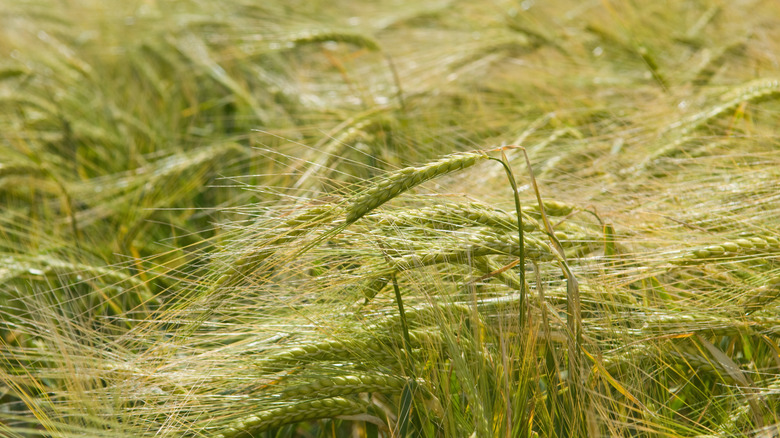A New Exotic Strain Of Wheat Could Be An Answer To Global Food Struggles
Unprecedented weather devastated farmlands worldwide in the summer of 2022. According to the Copernicus Climate Change Service, the European Union's Earth observation program, 2022 brought Europe its hottest summer on record and its worst drought in 500 years between June and August.
Essential crops like potatoes, onions, and carrots (the latter of which have exceeded 35,000 tons in previous years) fell greatly behind their usual numbers, a Yorkshire farmer told CNBC. With limited irrigation options, experts warned that half of the country's potato crop was expected to fail, per The Guardian. Likewise, dried-up fields meant a lack of food for cows, which also took a toll on dairy production.
Suzi Kerr, a chief economist at the Environmental Defense Fund, told The Hill that ignoring the link between climate change and global inflation will have "a huge impact not only on grocery bills, but many other aspects of our ordinary lives." In terms of food security, things have been looking pretty bleak. But before you go stocking up your bunker, there might be a light at the end of the tunnel.
Will 'climate-proof' DNA save the day?
What if there was a crop that could feed millions and thrive in extreme temperatures, like a cactus? If there were such a thing, the impact of historic droughts might be contained to issues that fall outside the threat of food insecurity. Together with the Earlham Institute in Norwich, the International Maize and Wheat Improvement Centre is testing a breed of wheat (which provides more "global calories" than any other crop) that could do just that.
The Earlham Institute shared details of the innovation with Science Daily, calling the crops "climate-proof." Using DNA from wild relatives, the exotic wheat contains a unique genetic makeup that makes it 50% more resilient to hot weather than other "elite lines" of wheat. Field trials are currently taking place in Mexico, which experienced its own ruinous drought this summer, per The New York Times.
The breakthrough is the latest in a line of potential solutions to global food shortages, sharing the stage with so-called "orphan crops" like millet and buckwheat, which have "disappeared because of [their] laborious processing method," per Time, but are just as nutritious as threatened crops like rice, wheat (not the super-DNA kind), and soybeans.

